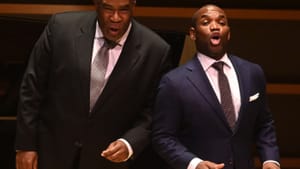Stay in the Loop
BSR publishes on a weekly schedule, with an email newsletter every Wednesday and Thursday morning. There’s no paywall, and subscribing is always free.
You heard it here first
Philadelphia Chamber Music Society presents Lawrence Brownlee and Eric Owens

A sold-out crowd welcomed tenor Lawrence Brownlee and bass-baritone Eric Owens to the stage of the Perelman Theater on February 22, where Philadelphia Chamber Music Society (PCMS) presented the first engagement of a multi-city recital tour. The artistic pairing proved notable for several reasons.
Philly roots
Both men have strong local connections. Owens grew up in Mount Airy and began his musical studies at Settlement Music School before matriculating at Temple and Curtis. He joins the faculty of his alma mater this fall as co-head of the opera department.
Brownlee serves as an artistic advisor to Opera Philadelphia, where he appeared last season in the world premiere of Tyshawn Sorey’s Cycles of My Being. That politically engaged song cycle might be the single most exciting local music event in recent memory.
An unusual pairing
Under normal circumstances, these two titans of the opera world likely wouldn’t find themselves sharing a stage. Brownlee, a dynamic lyric tenor, specializes in perennially hard-to-cast works of the bel canto repertory. More than two decades into his professional career, his voice remains pliant and easily produced.
Owens has made the leap into serious Wagnerian territory, debuting Wotan in Lyric Opera of Chicago’s ongoing new production of the Ring Cycle. The Metropolitan Opera announced earlier this week that he would sing the title role in Porgy and Bess on opening night of its 2019-2020 season.
A Nemorino and a Wotan on the same recital stage may seem strange, but Brownlee and Owens showed dexterity across an expansive program that included opera arias, spirituals, and selections from the Great American Songbook.
Solo stars
Each man had solo moments to shine. Brownlee easily dispatched the nine treacherous high Cs that cap “Ah! mes amis, quel jour de fête,” the showpiece aria from Donizetti’s La Fille du Regiment. He particularly dined out on the last sustained note, which Owens jokingly tried to replicate. Brownlee also displayed great textual attention to detail and sterling French diction in “Je crois entendre encore,” a plaintive ballad from Bizet’s The Pearl Fishers.
Owens thundered through Verdi’s “Infelice! E tu credevi” and offered a refined, humorous account of “Le veau d’or" from Gounod’s Faust. Yet his rendition of “Se vuol ballare” from Le Nozze di Figaro lacked the legato one craves in Mozart singing, and a few craggy notes suggested a possible cold.
Dual challenges
The duo’s first duet proved the evening’s one true misstep. Divorced from its context, Donizetti’s “Voglio dire, lo stupendo elisir”—a reliable highlight of L’Elisir d’Amore (The Elixir of Love)—caused the pair to strain for laughs, resorting to prop comedy with a stray dollar bill and a bottle of water standing in for the titular elixir. Owens struggled with the number’s tongue-twisting patter, and both men occasionally seemed out of step with each other—and with pianist Craig Terry, who provided workmanlike accompaniment.

Luckily, they regained composure in Bizet’s “Au fond du temple saint,” and that levity remained in place throughout the laid-back second half. Brownlee and Owens both remained onstage throughout its three sections, swapping banter and sight gags while singing separately and together.
Brownlee’s spiritual solo, “All Night, All Day,” held a personal connection. He dedicated it to his son Caleb, who is on the autism spectrum and whom he described as his "angel." The slight catch in his voice gave way to a delicately floated falsetto, as he sang of “angels watching over me, my Lord.”
First in Philly
Owens excelled in a surprise offering: an unprinted rendition of “Some Enchanted Evening,” which replaced Tony Velona’s “Lollipops and Roses.” (If you’re wondering why the latter song was excised, google the lyrics.) Although he couldn’t quite stick the song’s difficult ending, he wrapped his expansive bass notes around Oscar Hammerstein II’s elegant lyrics, which resulted in a great depth of feeling.
But the program’s unquestionable high was its final section, which spotlighted a trio of gospel favorites. This music found everyone operating at the highest level—including Terry, who tempered his more conservative touch with a healthy dash of spirit. Brownlee and Owens displayed a pure understanding of the genre’s idiom as they traded verses of “I don’t feel no ways tired” and “Every time I feel the spirit.” Those titles could rightly describe the audience’s ecstatic response.
Once the applause died down, the duo favored the crowd with a final encore: “This Little Light of Mine.” In the coming weeks, their light will shine in cities like Seattle, Los Angeles, Atlanta, Ann Arbor, and Winston-Salem. The PCMS crowd can say they heard it first.
What, When, Where
Lawrence Brownlee, tenor; Eric Owens, bass-baritone; Craig Terry, piano. Recital program of opera arias, traditional spirituals, American popular songs, and gospel favorites. Philadelphia Chamber Music Society. February 22, 2019, at the Kimmel Center’s Perelman Theater, 300 S. Broad Street, Philadelphia. (215) 569-8080 or pcmsconcerts.org.
Sign up for our newsletter
All of the week's new articles, all in one place. Sign up for the free weekly BSR newsletters, and don't miss a conversation.

 Cameron Kelsall
Cameron Kelsall